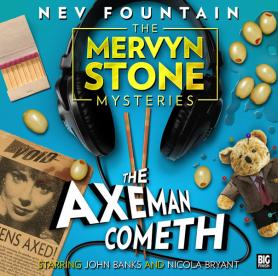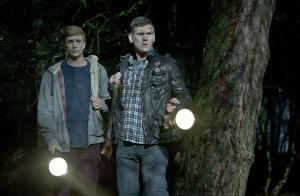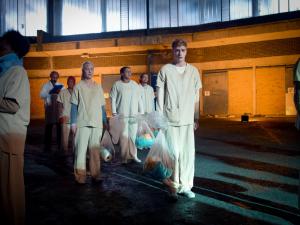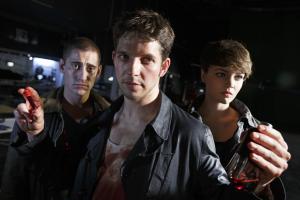The Mervyn Stone Mysteries: The Axeman Cometh (Big Finish)
Friday, 12 July 2013 - Reviewed by

The Mervyn Stone Mysteries: The Axeman Cometh
Big Finish Productions
Written by Nev Fountain
Directed by Patric Kearns
Released June 2013
Nev Fountain’s creation, Mervyn Stone, makes his audio story debut in The Axeman Cometh. Mervyn is the world-weary former writer and script-editor of (fictional) eighties’ TV show, Vixens from the Void, which over the years has found a dedicated cult following. He's played by the note-perfect John Banks while Nicola Bryant shines as Vixens’ star and all-round diva Vanity Mycroft (with both actors also contributing a range of other characters). Mervyn has already appeared in a series of novels – Geek Tragedy, DVD Extras Include: Murder, and Cursed Among Sequels – working his way through scenarios familiar to fandom such as conventions, the recording of DVD commentaries, and attempts to revive cult shows. The Axeman Cometh shares a great many pleasures with the books: it allows the audience to spot parallels with real-life cult TV and its fans, and it positions Mervyn as an amateur detective sleuthing his way through cult telly-related crimes and dastardly deeds. On this occasion, Mervyn has become involved in writing for a fan-made audio version of Vixens from the Void, and so decides to attend the studio recording of his new story. But with so many egos cooped up in a confined space, there’s the potential for deadly geek drama.
The Axeman Cometh is almost audio à clef. There’s a self-obsessed TV executive who, back in the day, delighted in cancelling 1980s shows (Vixens from the Void among them), and there’s an oddball scriptwriting couple Dick and Dora who are renowned for turning in their scripts in double quick time. Hailing from a writer with Fountain’s background in comedy you’d expect this to be witty and sharp, which it most certainly is. But more than that, The Axeman Cometh revels joyously in its own form. It’s a mystery/detective story about the structure of detective stories and simultaneously a Big Finish audio about the creation of Big Finish audios (well, fan-produced continuations of beloved TV programmes, anyway). The audacity of track 14 has to be heard to be believed. Whatever you do, don’t skip ahead to this finale, because after The Axeman Cometh you might never think of audio dramas in quite the same way again.
Some of the script’s reference points are worn on its lycra-stretched Vixens’ sleeve. For instance, Mervyn draws our attention to possible similarities between the case he finds himself investigating and Hercule Poirot’s final case, Curtain. Listeners familiar with the full resonance of that statement might already be preparing themselves for a plot twist or two, but Fountain always remains several steps ahead of the game. Or he just goes ahead and plays a different game. Brilliantly. Either way, guessing the killer is a fiendishly tricky exercise. The (returning) fan characters producing this particular audio drama are dubbed ‘Speccy Derek’ and ‘Big-Nose Bob’, and their obsessive fixations are well pilloried. Perhaps the only down side to Mervyn’s world is that many of its gags hinge on assuming that fans are freakish, emotionally-stunted loons. It’s a well-worn trope, and I personally would’ve liked a little less of the ‘fanboys are weird’ stuff, even if Fountain adopts a similarly cynical view of media professionals, actors, and TV head-honchoes, filtering it all through Mervyn’s consciousness so that it’s clear we’re tackling a slightly skewed and crumpled viewpoint on the world.
It’s not often that a reviewer gets to say this, but my favourite things about this drama were probably its slightly more “clunky” moments – instants where you couldn’t help but feel ‘oh, that’s been shoe-horned in slightly’ or, ‘really? That seems implausible’. It’s a story that dares you to grumble about its finer points before fighting back against any potential criticism and winning the listener round with charm, cleverness and trickery. Indeed, there’s something very cathartic about the spurious morality confronted by Mervyn in this intricate tale where every detail matters.
Not content with inventing Vixens from the Void, Fountain also enjoys creating back stories for a few other cancelled TV shows such as Sunny Sayed Up (as I assume it must be written) and The Hairy Canaries – both of which involve some very broad stereotypes. But the tale of The Hairy Canaries and its hard-working acting community will strike a chord with those who remember the miner’s strike, while the villain of the piece is explicitly linked to Thatcherite policies. Despite all its real-world resonances and political references, this reminded me most of all of Fountain’s previous audio, Omega. That, too, capitalized on its nature as recorded sound to mislead and startle the listener, and it’s a trick pulled off just as deftly on this occasion. The Mervyn Stone Mysteries have been likened to Simon Brett’s work in the past, and The Axeman Cometh is playful, literary and 'meta' in the same moment that it palpably adores cult television. Postmodern? Perhaps. Above all, though, it's sheer good fun.









